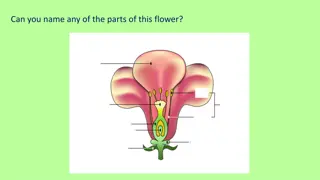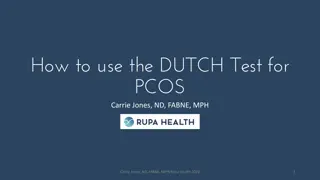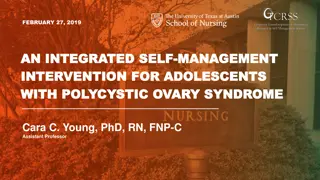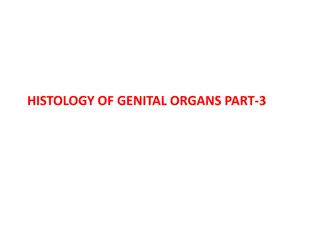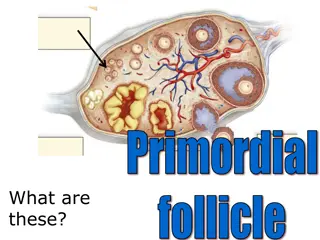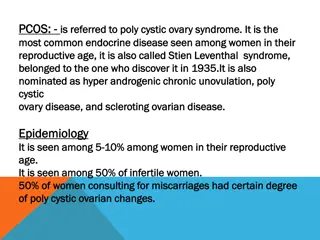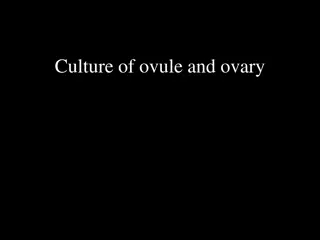PCOS and PCOD – What’s the Difference
(PCOS and PCOD) Polycystic Ovary Syndrome and Polycystic Ovary Disorder are commonly heard regarding women\u2019s health. These conditions are often used interchangeably, However, there is a difference between the two. PCOS is the more common of the two conditions and is caused by an imbalance of ho
7 views • 6 slides
Explore the Fascinating Life Cycle of Flowering Plants
Discover the various parts of a flower such as petals, stigma, stamen, anther, filament, nectary, sepal, ovary, and ovule. Learn about the role each part plays in plant reproduction by exploring activities on flower anatomy, seed dispersal, pollination, germination, and growth. Engage with interacti
0 views • 7 slides
Understanding and Utilizing the DUTCH Test for PCOS
Polycystic Ovary Syndrome (PCOS) is a common endocrine disorder in females with various genetic, environmental, and lifestyle influences. The Rotterdam Criteria, involving oligo/amenorrhea, hyperandrogenism, and polycystic ovaries, is used for PCOS diagnosis. The DUTCH Complete test can assess insul
0 views • 92 slides
Integrated Self-Management Intervention for Adolescents with Polycystic Ovary Syndrome
Research led by Cara C. Young focuses on developing a mindfulness-based healthy lifestyle intervention for adolescents with polycystic ovary syndrome (PCOS) and their parents. The study aims to improve self-management capabilities among adolescents with PCOS, a condition that impacts both physical a
0 views • 9 slides
Female Ovary Histology and Function Overview
The female reproductive organ, the ovary, plays crucial roles in oocyte development, hormone production, and ovulation. Structurally, ovaries have a cortex and medulla, with follicles containing oocytes and surrounding cells. The primary follicle marks the onset of follicular maturation, leading to
0 views • 12 slides
Understanding Ovarian Follicles: Growth Stages and Cellular Composition
Ovarian follicles are the main functional units of the ovary, comprising an oocyte, granulosa cells, and theca cells surrounded by epithelial layers. The growth stages include primordial, primary, and secondary follicles, each characterized by specific cellular changes and development processes driv
0 views • 8 slides
Optimizing CHO Bioprocesses with Amino Acid Prediction Tool
University of Massachusetts Lowell has developed a genome-scale model for Chinese Hamster Ovary (CHO) cells, enhancing bioprocess optimization. The Amino Acid Level Prediction Tool complements this, aiding in predicting key nutrient levels for improved process control. Supported by advanced algorith
0 views • 21 slides
Exploring Female Reproductive Anatomy through Visual Images
Uncover the intricate details of the female reproductive system with a series of informative images depicting structures like the vagina, cervix, ovary, and more. Dive into the world of primordial cells, oocytes, and the various layers of the uterus, shedding light on the complexity of female reprod
0 views • 32 slides
Understanding the Reproductive System
Explore the intricate details of the female and male genital apparatus, including the uterus, ovary, and testicles. Learn about the processes of ovulation, menstruation, and spermatogenesis. Uncover the complexities of the uterine and ovarian cycles, as well as the formation of spermatozoa.
0 views • 10 slides
Cancer Types Spending in Europe
Learn about the spending on various types of cancer in Europe including breast cancer, colorectal cancer, prostate cancer, lung cancer, ovary cancer, and pancreatic cancer. The information is based on the Comparator Report on Cancer in Europe 2019, which covers disease burden, costs, and access to m
2 views • 7 slides
Understanding Polycystic Ovary Syndrome (PCOS): A Comprehensive Overview
PCOS, the most common endocrine disease in women of reproductive age, is characterized by various symptoms including abnormal metabolism of androgens and estrogen, insulin resistance, and hyperinsulinemia. This syndrome is associated with multiple theories explaining its occurrence, and its proposed
0 views • 10 slides
In Vitro Culture of Ovule and Ovary for Haploid Plant Production
In vitro culture of unpollinated ovaries and ovules offers an alternative method for haploid plant production. This process involves isolating and culturing ovules in a chemically defined nutrient medium to understand zygote development and embryo maturation stages. Techniques for collecting, prepar
0 views • 34 slides
Exploring Alternatives to Traditional Spay-Neuter Practices in Dogs
The article discusses the growing trend of alternatives to ovariohysterectomy (OHE) for spaying in dogs, questioning the long-held beliefs and examining the potential consequences. It explores the concept of ovary-sparing spay and its potential impact on longevity and health outcomes in dogs. Additi
1 views • 35 slides

